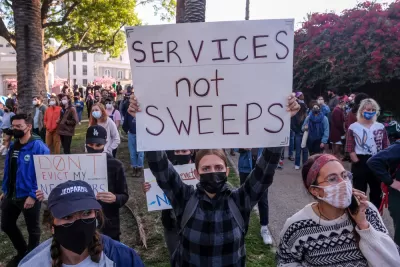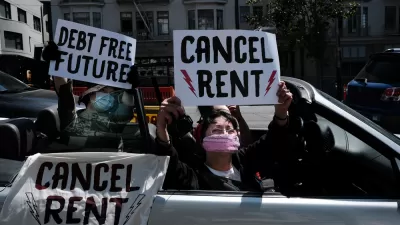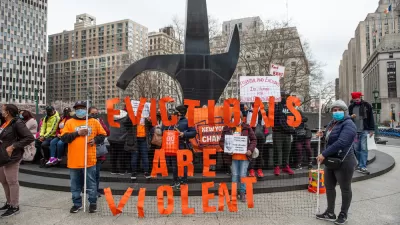With regular updates of rent debt data from around the United States, a new dashboard reveals the depths of one of the most pressing crises of the pandemic.

The National Equity Atlas and the Right to the City Alliance this week launched a new rent debt dashboard with near real-time data on the number and characteristics of renters behind on rent for the United States, 45 states, and 15 metropolitan areas.
An article by Sarah Treuhaft, Jamila Henderson, Michelle Huang, Alex Ramiller, and Justin Scoggins introduces the dashboard, which raises awareness about the mounting rent debt and the potential for mass eviction as "one of the most pressing equity issues created by the Covid-19 pandemic."
"The vast majority of renters who are in debt are low-wage workers — disproportionately people of color — who’ve suffered job and income losses due to the pandemic," according to the article.
The aggregate numbers reveal a debt crisis of a similar scale of the foreclosure crisis of the Great Recession. "As of the end of March 2021, 5.7 million renters – 14 percent of all renter households – were behind on their rent payments," according to the article. The total rent debt owed is estimated at $20 billion. "For comparison, nearly 8 million households lost their homes to foreclosure due to the 2008 financial crisis."
Solutions to all that mounting debt, according to the article, include eviction protection, debt relief, and financial support. With that support, many of these millions of renter households will face eviction.
The dashboard draws data from the Census Bureau’s Household Pulse Survey and the University of Southern California Center for Economic and Social Research's Understanding Coronavirus in America survey, and will be refreshed approximately every two weeks. The full methodology is available online here.
FULL STORY: Rent Debt in America: Stabilizing Renters Is Key to Equitable Recovery

Planetizen Federal Action Tracker
A weekly monitor of how Trump’s orders and actions are impacting planners and planning in America.

Restaurant Patios Were a Pandemic Win — Why Were They so Hard to Keep?
Social distancing requirements and changes in travel patterns prompted cities to pilot new uses for street and sidewalk space. Then it got complicated.

Map: Where Senate Republicans Want to Sell Your Public Lands
For public land advocates, the Senate Republicans’ proposal to sell millions of acres of public land in the West is “the biggest fight of their careers.”

Maui's Vacation Rental Debate Turns Ugly
Verbal attacks, misinformation campaigns and fistfights plague a high-stakes debate to convert thousands of vacation rentals into long-term housing.

San Francisco Suspends Traffic Calming Amidst Record Deaths
Citing “a challenging fiscal landscape,” the city will cease the program on the heels of 42 traffic deaths, including 24 pedestrians.

California Homeless Arrests, Citations Spike After Ruling
An investigation reveals that anti-homeless actions increased up to 500% after Grants Pass v. Johnson — even in cities claiming no policy change.
Urban Design for Planners 1: Software Tools
This six-course series explores essential urban design concepts using open source software and equips planners with the tools they need to participate fully in the urban design process.
Planning for Universal Design
Learn the tools for implementing Universal Design in planning regulations.
Heyer Gruel & Associates PA
JM Goldson LLC
Custer County Colorado
City of Camden Redevelopment Agency
City of Astoria
Transportation Research & Education Center (TREC) at Portland State University
Camden Redevelopment Agency
City of Claremont
Municipality of Princeton (NJ)





























